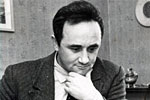


ChessBase 17 - Mega package - Edition 2024
It is the program of choice for anyone who loves the game and wants to know more about it. Start your personal success story with ChessBase and enjoy the game even more.
Dennis Monokroussos writes:
 The
late Efim Geller (1925-1998) is one of my favorite players of yesteryear, and
with good reason. He was among the world's best for about 30 years, and among
his many achievements are two Soviet championship titles, an incredible six
times in the Candidates cycle, and a +2 career score against Bobby Fischer.
He was a great theoretician, as evidenced by Botvinnik's famous remark that
"before Geller, we did not understand the King's Indian." Geller was
at times a trainer as well, and according to Kasparov he helped Botvinnik, Petrosian,
Spassky, Karpov and (in an unofficial capacity) Kasparov himself in world championship
matches. He was never world champion (though he tied for first in the 1991 world
senior championship and won it outright in 1992), but he was a very important
figure in the not-too-distant history of our game.
The
late Efim Geller (1925-1998) is one of my favorite players of yesteryear, and
with good reason. He was among the world's best for about 30 years, and among
his many achievements are two Soviet championship titles, an incredible six
times in the Candidates cycle, and a +2 career score against Bobby Fischer.
He was a great theoretician, as evidenced by Botvinnik's famous remark that
"before Geller, we did not understand the King's Indian." Geller was
at times a trainer as well, and according to Kasparov he helped Botvinnik, Petrosian,
Spassky, Karpov and (in an unofficial capacity) Kasparov himself in world championship
matches. He was never world champion (though he tied for first in the 1991 world
senior championship and won it outright in 1992), but he was a very important
figure in the not-too-distant history of our game.
Accordingly, it's appropriate to celebrate his legacy every now and again, though it's slightly ironic that the game we'll look at later tonight, against the famous attacking player Dragoljub Velimirovic (1942- ), from the 1971 Capablanca Memorial in Havana, sees him defeating his opponent's King's Indian rather than employing it himself. Velimirovic provoked an early tactical crisis, as is his wont, and had Geller responded normally, Black would have enjoyed excellent compensation for his intended pawn sacrifice.
Instead, Geller sacrificed an entire rook for long-term attacking prospects. His decision was impossible to justify by calculation alone, but his gutsy and creative choice proved correct. Ultimately, he regained the material, reached a superior endgame, and in the end won a terrific game.
It's a game well worth seeing, so I hope you'll all join me tonight (Thursday night) at 9 pm ET. Hope to see you then!
Dennis Monokroussos' Radio ChessBase lectures begin on Thursdays at 9 p.m. EDT, which translates to 01:00h GMT, 02:00 Paris/Berlin, 11:00h Sydney (on Friday). Other time zones can be found at the bottom of this page. You can use Fritz or any Fritz-compatible program (Shredder, Junior, Tiger, Hiarcs) to follow the lectures, or download a free trial client. |
You can find the exact times for different locations in the world at World Time and Date. Exact times for most larger cities are here. And you can watch older lectures by Dennis Monokroussos offline in the Chess Media System room of Playchess:

Enter the above archive room and click on "Games" to see the lectures. The lectures, which can go for an hour or more, will cost you between one and two ducats. That is the equivalent of 10-20 Euro cents (14-28 US cents).
 Dennis
Monokroussos is 40, lives in South Bend, IN, and is an adjunct professor
of philosophy at the University of Notre Dame.
Dennis
Monokroussos is 40, lives in South Bend, IN, and is an adjunct professor
of philosophy at the University of Notre Dame.
He is fairly inactive as a player right now, spending most of his non-philosophy time being a husband and teaching chess. At one time he was one of the strongest juniors in the U.S., but quit for about eight years starting in his early 20s. His highest rating was 2434 USCF, but he has now fallen to the low-mid 2300s – "too much blitz, too little tournament chess", he says.
Dennis has been working as a chess teacher for seven years now, giving lessons to adults and kids both in person and on the internet, worked for a number of years for New York’s Chess In The Schools program, where he was one of the coaches of the 1997-8 US K-8 championship team from the Bronx, and was very active in working with many of CITS’s most talented juniors.
When Dennis Monokroussos presents a game, there are usually two main areas of focus: the opening-to-middlegame transition and the key moments of the middlegame (or endgame, when applicable). With respect to the latter, he attempts to present some serious analysis culled from his best sources (both text and database), which he has checked with his own efforts and then double-checked with his chess software.